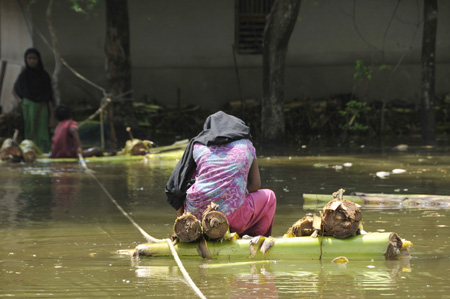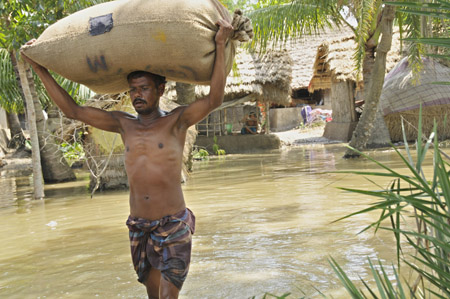 |
|
People raft in the floodwaters in Khulna, southwestern Bangladesh, on May 28, 2009. At least 131 people died and 1,123 people are still missing after the cyclone Aila hit Bangladesh's southwestern coast on Monday, officials said on Thursday. [Qamruzzaman/Xinhua]
|
The cyclone affected people in Bangladesh are fighting for survival with insufficient clean drinking water, food and medicine.
Cyclone Aila attacked Bangladesh's southern coastal areas on Monday. According to the latest statistics from the Disaster Management Ministry, the cyclone has left 131 people dead, 1,123 missing and 6,500 injured.
In Koyra Sub-District of Khulna District, 180 km southwest of capital Dhaka, what can be seen everywhere is water: houses are under water, trees are under water, paddy fields are under water, shrimp breeding plants are under water.
Domiz Uddin, one villager in Dayara Village of Koyra, told Xinhua on Thursday 80 percent of houses in their village are damaged, and the homeless people are living in the open or makeshift tents made along the main road.
"The biggest problem is drinking water. Before the cyclone, the villagers took water from the ponds or tubewells. After the cyclone, the ponds are polluted, and many tubewells are under water and also polluted," Uddin said.
 |
|
A man carries a sack of rice as he wades through the floodwaters in Khulna, southwestern Bangladesh, on May 28, 2009. [Qamruzzaman/Xinhua]
|
"The number of people suffering diarrhea is on the rise because of being inaccessible to clean drinking water," he added.
Many people were seen queuing up to collect water from some unpolluted tubewells which are far from where they live.
Mubarak Dhali, a local resident, said he walked almost one hour to a tubewell to get some water. "It is so inconvenient for us," he said.
Yousuf Ali, a young man in his twenties, lost 5 members in his family and all the properties during the attack of Cyclone Aila.
"My village is inundated. I have to depend on the relief goods to survive," he said.